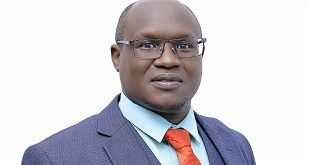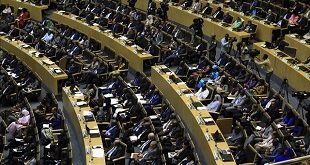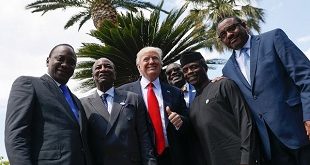
By Independent Team
Prosecutor and Police fight over Nsenga investigation
Investigations following the death of business tycoon Juvenal Nsenga Kananura always seemed pretty straightforward and routine. Nsenga died after his wife Jackie Uwera, knocked him in her car at their Bugolobi home in January 2013. The death of Nsenga has been the subject of investigation by Uganda Police homicide investigators.
Ms. Uwera, who has been in police custody since January 2013 at the Special Investigations Unit cells at Kireka in Kampala, is at the centre of the investigations. But this is no ordinary investigation. What should have passed as routine has now pitied the two most important criminal justice arms of the State against each other – the Uganda Police and the Directorate of Public Prosecutions (DPP).

The row, which has also sucked in the Attorney General, has now been escalated to the Prime Minister and President Yoweri Museveni.
Investigations by the police concluded that the incidents leading to Nsenga’s death might not have been pre-meditated. The police forwarded the case file to the DPP for legal advice and preference of the relevant criminal charges based on the facts as presented by the police.
The DPP after considering the facts as presented by the police, preferred the charge of murder and advised that Ms. Uwera be produced in court and charged with the offence. This recommendation became controversial when the police strongly disagreed with the DPP.
Police wrote a long explanation to the DPP that from their investigations, they did not have evidence of malice aforethought i.e. premeditation – which is the basis of a murder charge. They argued that from their investigation, they would be comfortable with a charge of man slaughter.
However, the DPP replied to the police that he had read the file and scrutinized the findings of the police investigation and still felt they should still go ahead with murder. If this were not proven, the DPP reasoned, the matter should be left to the court to scale it town to man slaughter. Legal experts interviewed by The Independent confirm that this procedure, of reducing a high offence to a lower one, is common practice in courts.
Police investigators whom The Independent has spoken to say that they found the DPP’s position suspicious. “We are the ones who investigate cases, bring witnesses to court and help the DPP prosecute the case,” one police source said, “We have no evidence to support a charge of murder and have explained this to the DPP.
But we have sufficient evidence to sustain a charge of man slaughter and even a high chance of winning the case. He has refused to listen to us. Instead he wants a charge of murder for which we have no evidence at all. How do you explain such behavior?”
It is for this reason that police had requested the DPP to reconsider the matter but the DPP stood his ground and insisted that Ms. Uwera should be charged with murder. This led the Police to seek the advice of the Attorney General. Police officers we talked to say they did not seek the Attorney General’s intervention to direct the DPP because they know that it is against the constitution. They sought his guidance on what happens when the DPP directs them to do that which they think is wrong.
The Attorney General, reasoning that he has no power to call for a file for review from the DPP, has in turn escalated the matter to the Prime Minister and the President, seeking their advice on the matter and to assist him to get the file of the case from the DPP.
In response, the DPP has invoked his powers under Article 120 of the Constitution and insisted that nobody, even the Attorney General, has the power to alter his decision. As it is, the Police is at liberty to seek whatever opinion they so desire but that will not change a thing about his position.
Different family ties
This controversy has sparked an intense debate about what appears to be a deteriorating relationship between the police and the DPP, as well as the degree to which the DPP is independent of the police, and the role of either department of government in the criminal justice system. There has been criticism of the public nature of the fall out too.
But to most who know the deeper insights of the case and the personalities involved, the case is not about the law being misapplied to the facts but rather a case of family ties, wrangles and loyalties playing out on the national stage with Ms. Uwera as the pawn on a chess board of many pieces.
From the moment of Nsenga’s death, it was clear for any curious on-looker that it was bound to come to this near tragicomedy. Nsenga was a Mufumbira by ethnicity and so is the Inspector General of Police, Maj. Gen. Kale Kayihura and Richard Buteera, the out-going DPP who has presided over the case. Both Buteera and Kayihura were conspicuously present at deceased’s home in Bugolobi and it was clear that they were well known to the family of the deceased.
Maj. Gen. Kayihura is related to Ms. Uwera by marriage – Ms. Uwera being a distant cousin to Mrs. Kayihura. According to sources close to the families, Ms. Uwera even spent a couple of nights at Maj. Gen. Kayihura’s home before she was formally arrested and taken into police custody. Mrs Kayihura was present at the hospital before Nsenga died. But those who know Kayihura well vouch that he is not the type of IGP to be swayed by family ties in making a decision about such a matter.
However, regardless of such factors, it was clear from the onset that the two heads of Uganda’s criminal justice departments had insider knowledge of both families, which was likely to bias their opinions – or, as other observers have said, give them better insight into the wrangles than if they were ordinary and detached persons in the matter.
A lawyer who spoke to The Independent wondered why both gentlemen did not publicly declare their relationships with the families and excuse themselves from the case. To this, police say Kayihura declared his relationship to Uwera and kept a reasonable distance from the investigation.
Indeed, police say Kayihura appointed AIGP Godfrey Musana who is the Deputy Director of CIID to oversee the investigations and not even report to him. The Independent has also spoken to Musana who has confirmed Kayihura’s position. Musana is an experienced police officer whose independence is highly respected. Indeed, Kayihura’s critics say the IGP bypassed him to appoint Grace Akullo the Director of CIID, because he is very independent.
When The Independent talked to Musana, he declined to divulge further details of the findings of the case, reasoning that the matter was now in the High Court and he was no longer at liberty to say anything lest it be interpreted as sub-judice.
However, members of the Kananura family told this newspaper that Musana told them the police had a good chance of willing a case of man slaughter but near zero chances of winning on murder. Efforts to get an opinion from the Attorney General did not yield much as he repeatedly stated that he was too busy to talk.
The Independent has not been able to establish the nature of the relationship between Buteera and the Nsenga family. However, we were able to establish that they have known each other for a long while. Buteera confirmed to The Independent in a brief telephone interview that the Nsenga case is familiar to him and that he did prefer murder charges against the accused but asked this newspaper to direct further questions to the Police.
“What happens is that Police sends the file to the DPP’s office for an opinion; we study the file and make recommendations. We then send the file back to the Police who then proceed by producing the suspect in Court along with the file,” Buteera explained. “What we have done has been professionally handled and that is all. The rest you should ask the Police.”
It is very possible that Butera (or the DPP’s office for that matter) acted professionally in recommending murder. There is no evidence of influence from the Kananura family on the DPP himself. However, some observers close to the parties involved say that it is possible Kayihura (and through him the police’s) actions may have been influenced by suspicion that the DPP was acting on behalf of the Kananura family. If this is true, it may have made Kayihura see the DPP’s advice as motivated by a hidden intent.
Understandably, the Kananura family is deeply aggrieved by the death of Nsenga and could be acting out of an emotional desire to avenge the death of their relative or a genuine search for justice. But why would two government departments be so emotionally drawn into the case in an almost acrimonious manner?
Police sources say Kayihura is convinced by police investigations that there is no strong evidence to warrant murder charges. The source goes ahead to say that it is possible the IGP thinks the DPP could have done so to calm down the emotions of the Kananura family.
But Innocent Bisangwa a brother to the late Nsenga and a former Principle Private Secretary to President Yoweri Museveni, says, “Kayihura is bothered by his conscience and if indeed this is the case, it should not be the case because it is not him who charges suspects”. He continues, “in law that sole authority falls in the hands of the DPP… It is not the role of the IGP and that’s an opinion and let the Court decide.”
However, people close to both families – of Uwera and Nsenga and who have spoken to the Independent on condition of anonymity due to the emotional nature of the case, say that the management of the deceased’s estate could most likely be at the centre of the dispute.
Nsenga was a wealthy businessman who owned a fleet of over 100 trailer trucks and was a pioneer long haul transporter in the country. He is said to have owned prime real estate in Kampala’s up-scale suburbs and according to a reliable source, he had several tens of billions of shillings held in accounts with local banks. The Independent has not been able to independently verify Nsenga’s wealth.
Legal experts this newspaper has spoken to say that if Uwera is charged with murder, she cannot apply for letters of administration of her late husband’s estate. So, could it be that police, in resisting a charge of murder, is acting on Kayihura’s suspicion that the Kananura family want such a charge in order to deprive Uwera of her inheritance?
Could it be that Kayihura suspects Butera of acting on Kananura’s family interests? It is difficult to tell the subjective motivations of Kayihura but this line of reasoning – if true – could be a possible reason for the IGP’s actions.
The Independent has also spoken to friends of the Kananura family who attended the vigil in Bugolobi and the burial in Butogota and who confirm that some members of the Kananura family did not hide the feeling that Ms. Uwera had “killed” their brother “so that she could inherit his wealth” and that they would do whatever it takes to block her from benefitting from the death of Nsenga.
One of Nsenga’s brothers who spoke to The Independent on condition of anonymity said that his brother had serious marriage problems with Uwera so severe that there was a “cold war” in the home.
Unconfirmed reports the Independent has received indicate that soon after the burial of Nsenga, Ms. Uwera was asked by the Kananura family to execute a waiver of any right to the estates or the management of the same, and she did. And that the Kananura family continues to push for the charge of murder in order to make sure that Ms. Uwera cannot legally benefit from her “criminal enterprise”.
Friends who attended the burial in Butogota also told the Independent that in Mzee Donati Kananura’s eulogy, he spoke very unequivocally about the source of Nsenga’s wealth and traced it directly to himself, even stating that he handed his transport business to Nsenga to run, leading observers to believe he could have been laying ground for claims to the estate.
However, family friends to the Kananura family deny such allegations as silly. Most of the involved members of the family are richer than Nsenga was. Most of his brothers and sisters therefore have little or no interest in his private estate. Family friends say that it would be absurd if the family allowed Uwera who killed their brother to inherit his estate especially so because there is strong evidence that she killed him for that purpose.
Bisangwa dismisses these allegations and says those insinuating that the family is desperate to take over Nsenga’s estate do not know what they are talking about. “Those who know the Kananura family know that none of us is desperate for the deceased’s money. We are all comfortable in our own rights”, he states
“First and foremost,” Bisangwa says, “it is not the family that decided to prefer murder charges against the suspect. Secondly, the family is still hurting and has always wanted to establish the truth and seek justice and lastly, the late Nsenga was not the most prosperous in the family.”
“Lastly, legally, it is the children and the widow who are entitled to Nsenga’s estate and we know that very well,” Bisangwa said.
Whatever is driving the DPP and the IGP in this matter – whether it is pure professional judgment or influence of family interests – the dispute over Nsenga’s death is not good for both institutions
Additional reporting by Ronald Musoke
 The Independent Uganda: You get the Truth we Pay the Price
The Independent Uganda: You get the Truth we Pay the Price


